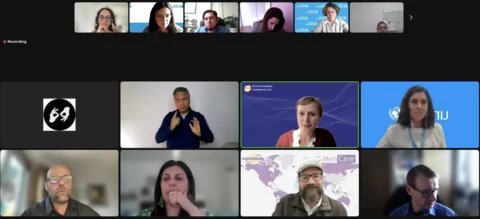On June 08, 2023, the EU-LAC Foundation, the Global Alliance for Care, the National Institute of Women of Mexico (INMUJERES), UN Women for the Americas and the Caribbean and the Economic Commission for Latin America and the Caribbean (ECLAC) and the Early Childhood Development Action Network (ECDAN) successfully held the dialogue "Childcare: good practices and challenges for building comprehensive care systems in the EU and LAC". This event represented the fourth in a series of interregional dialogues promoted by the EU-LAC Women's International Network on the challenges and opportunities for the construction of comprehensive care systems in the European Union, Latin America and the Caribbean. Around 100 persons from both regions attended the virtual event.
The event was inaugurated by Lucía Scuro, Social Affairs Officer Economic Commission for Latin America and the Caribbean (ECLAC), who reflected on the collective construction of the concept of care. This construction must be guided by a co-responsibility approach to accompany national and subnational governments in the design of national and subnational care systems and by an intersectoral approach to coordinate and involve the different levels of government in a comprehensive manner. In addition, as other pillars in the construction of comprehensive care systems, she highlighted the need for financial sustainability and the principles of universality and progressivity to consider those populations that most require care services and those that provide them.
Shekufeh Zonji, Global Technical Leader at ECDAN, then presented the advances and challenges of childcare systems, policies and models in the EU and LAC. She highlighted the Nurturing Care Framework and how gender influences access, quality and protection of the care environment in communities, families, services and policies. Among other positive aspects, she celebrated the development of regional and national policy frameworks to ensure quality early childhood care and evidence demonstrating the positive economic impact of investing in childcare policies. However, vulnerable and marginalised children, such as children with disabilities, migrant, refugee and Roma children, still face additional difficulties in accessing care services and quality public services.
The main panel, moderated by Anna Barrera, Senior Programme Coordinator at the EU-LAC Foundation, was made up of Jiri Svarc, Head of Unit for Social Policies, Child Guarantee, Directorate General Employment, Social Affairs and Inclusion, European Commission; Agata D’Addato; Senior Project Manager Eurochild; Martha Merlo Huerta, Social Policy Officer UNICEF Mexico; Julio Bango, UN Women Consultant and Former National Secretary of Care of Uruguay; Wessel van den Berg, MenCare Official at Equimundo and Co-founder of the MenCare Global Fatherhood Campaign. Their contributions addressed progress on commitments to ensure early childhood care policies and systems in both regions such as the European Child Guarantee adopted in June 2021, the Buenos Aires Commitment adopted in November 2022 and the European Care Strategy presented in September 2022. In the second round, they highlighted the need to strengthen coordination efforts between different areas (education, health, economy, labour, among others) and levels of government according to their competences in order to design a social organisation of care in conditions of equality.
The panel with the experts was followed by an interactive dialogue with those attending the event moderated by María Sánchez, Content Coordinator at Latin American Foster Care Network (RELAF) For the right to live in family and community and Oscar Melchor, Coordinator RELAF Mexico. During the dialogue, an interactive tool was enabled to collect the opinions and perspectives of many of the attendees. The dialogue revolved around two guiding questions: What are the priority elements for incorporating child care into comprehensive gender-transformative care systems? How could care systems under construction contribute to children's adequate development and promote gender equality? The main conclusions were the need for greater complementarity between the children's and gender equality agendas and to develop indicators and protocols to ensure quality standards in the provision of care services by providing training and capacity-building services for caregivers.
Raquel Coello, Economic Empowerment Policy Specialist at UN Women Regional Office for the Americas and the Caribbean, highlighted in the closing remarks the Summit of Heads of State between the European Union and the Community of Latin American and Caribbean States (CELAC), which will take place in July 2023, as an opportunity to move towards a bi-regional care pact to strengthen the commitments made in both regions and work on the basis of common objectives and challenges.
